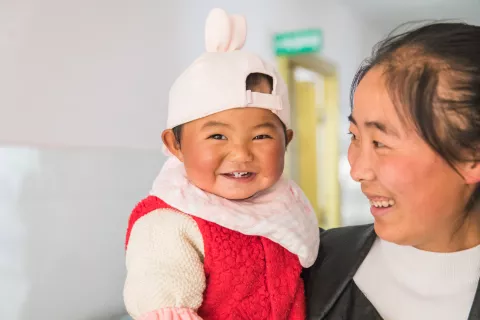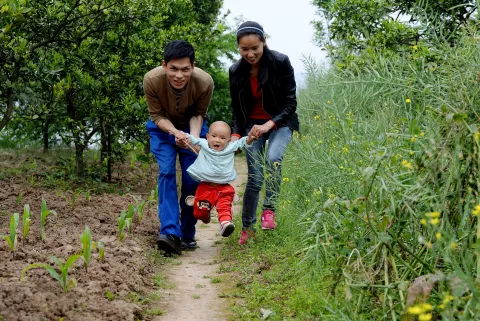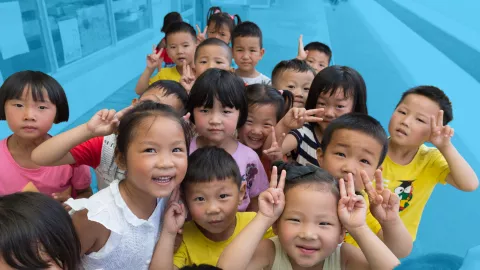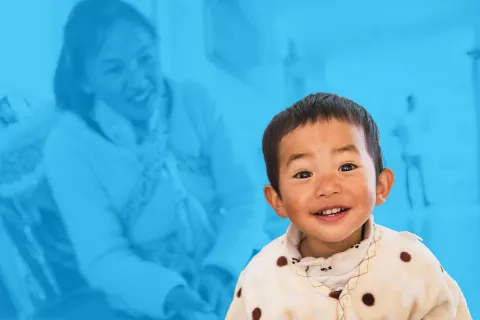Exploring the Power of Play
UNICEF's ‘Community-Based Family Support Services’ project
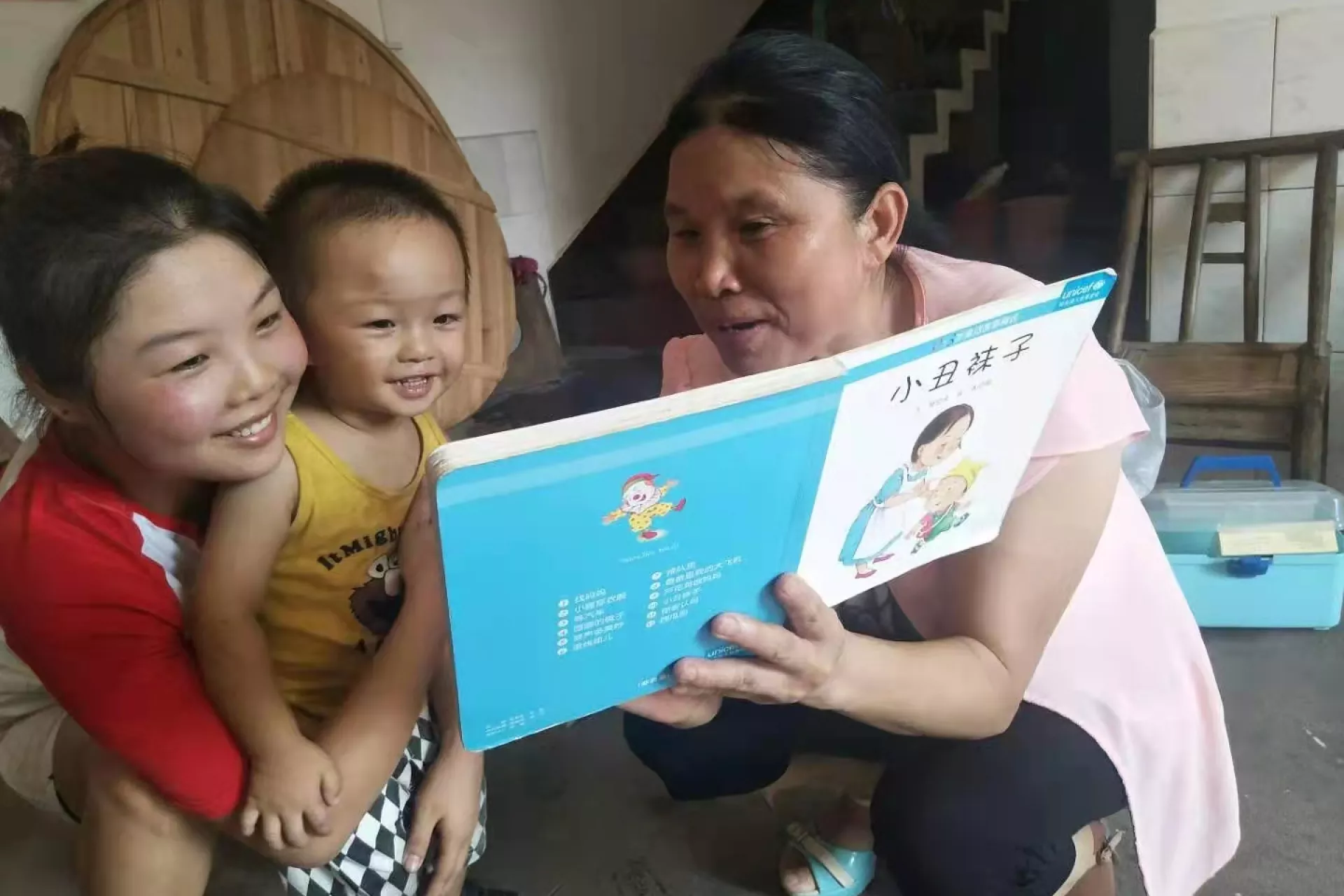
- Available in:
- 中文
- English
“Play is the highest form of research”
Teacher Yang has vivid memories from his childhood of playing among the bamboo forests and in the mud. His colleagues remember having freedom to explore and take risks, such as learning persistence and agility by climbing trees. Teacher Yang and fellow early-years educators had a chance to reminisce as they pondered their recollections of play, as part of a recent training on UNICEF's ‘Community-Based Family Support Services’ project.
Thinking back to how these diverse sensory experiences helped us learn, discover and develop reveals the integral role of play in a child’s development. UNICEF places play at the heart of a child’s early-years learning. It may seem like play is about having fun, but for babies and toddlers, play is the fundamental way that they learn, testing out and mastering foundational skills for the whole of life.
In China, millions of children aged 3 and 4 years old still lag behind in their cognitive and socio–emotional development. Many of these children live in ethnic minority communities and are affected by poverty and migration, either left behind by migrating parents or migrating with their parents. Studies suggest that these developmental delays are due to unstimulating home environments and little interactive parenting, such as playing with children, reading and storytelling. Caregivers, families and communities can turn this situation around if they are equipped with the knowledge, skills and resources to best support their child’s development. Community-based family support services are an important way to provide caregivers and families with guidance and information in an affordable, accessible way. Supported by the LEGO Foundation, UNICEF China is working with the All-China Women’s Federation on models to expand access to these services through centres around the country.
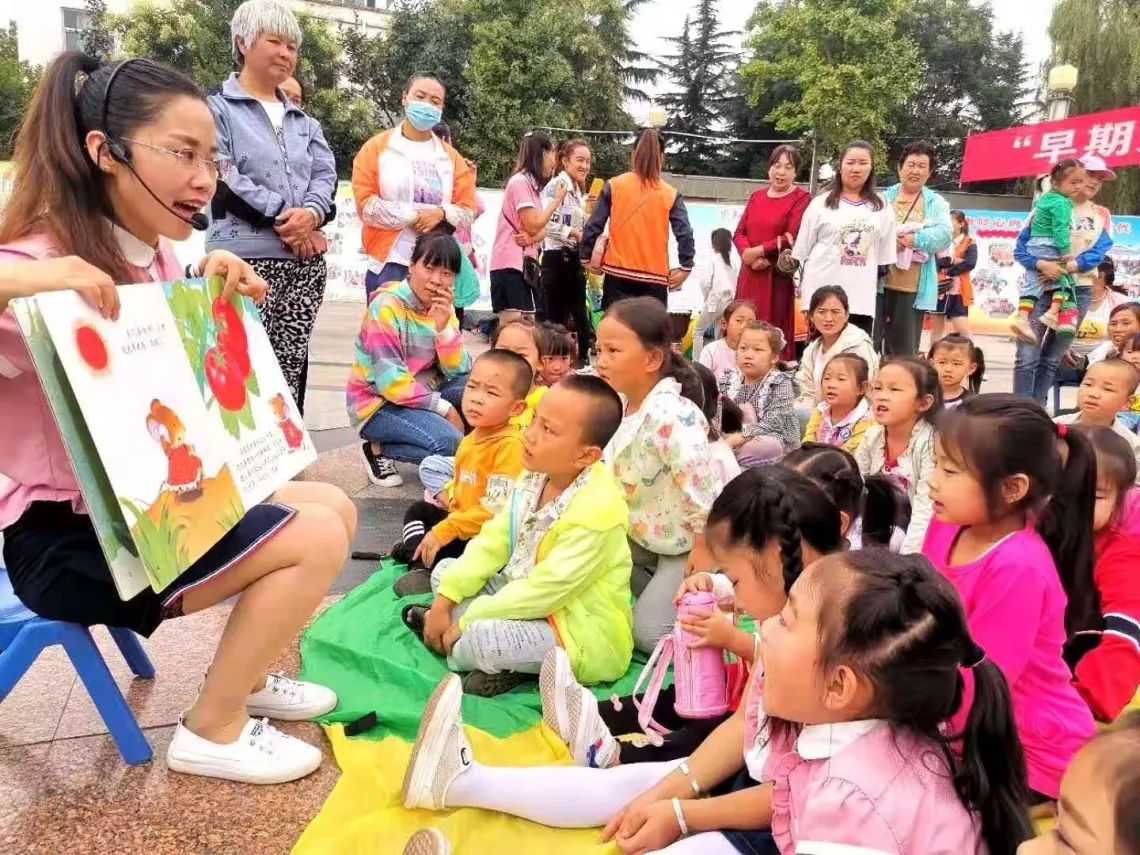
The project’s expert team is developing Play Kits of toys, play equipment and books to use in centres and for families to borrow to create stimulating environments at home. An app will complement the Play Kits to provide caregivers with ideas and guidance on how to organize play-based activities at home and support frontline workers to manage play kits. In preparation, the expert team joined five specialists from the Erikson Institute in Chicago and one from the University of Denver to hear about the latest research on games, play, reading and early childhood development.
Over five days, participants explored important topics such as the fundamentals needed for a child to thrive. Children have a basic need for safety and security, but there are other things needed for children to be in a prepared state to learn and play.
“It’s important to think about whether the child is prepared before they come into a classroom”, says Dr Jennifer Rosinia. “Are there basic needs met, are they hungry, are they sick, do they need their diaper changed?
Discussion turned to creating environments that are most conducive to learning, and how to set up toys and activities to maximize their potential for children to master new skills. Dr Elizabeth Turtell observed how many of the pre-school classrooms she enters use bright colours and spaces crowded with busy surfaces and large numbers of toys.
“One teacher I was working with was concerned that the children were always shouting,” says Dr Turtell, “but as soon as we worked to simplify and tone down the colors in the space, the children calmed down. Children’s moods are influenced by colour and chaos in the same way that adults’ moods are.”
This is how a classroom environment communicates with children. Prepared environments that consider how children will feel in a space can equip them to learn.
As the training progressed, participants shared suggestions on how to re-arrange their classroom spaces, putting into practice concepts they had just heard about like the mix of hard and soft boundaries and creating inviting ‘zones’ for children to choose their own activities and get into focused activities.
The expert team explored the positive power of stories, and how telling stories, singing songs and commentating on daily life helps babies and children make sense of the world around them and connect the dots between what they are experiencing and words, pictures and previous experiences.
“Adults and babies differ when it comes to repetition,” shared Dr Mary Hynes-Berry with the group. “Babies love familiarity, it becomes more meaningful for them each time.” Screens are not a total replacement for this, because the interaction with the adult is what makes the brain grow, through the child and the adult taking turns, reacting and responding to one another.
Professor Toni Linder talked about how to support the play between children of mixed ages, which is meaningful for young children to learn and build their relational skills at the same time. Professor Linder introduced a method for creating an inclusive environment with materials for children of all ages to play at a developmentally appropriate level, and having children work in pairs on artwork to encourage communication and problem solving. There was hot discussion on how to ensure the centres serve all children, including children with special needs, and participants were eager to know how to help. One suggestion was creating activities that intentionally make it easier for children with disabilities to be involved – such as teaching a whole class basic sign language when there is a child in the class who is deaf, which helps all children improve their communication skills.
Now the team will use what they’ve learned to further develop the Play Kits, ready for testing in the community later this year, giving more children under 6 years old more chances to play and learn. If you are interested in learning how you can help a child develop through play, you can find some resources on our Early Moments Matter page, and the UNICEF parenting site.


